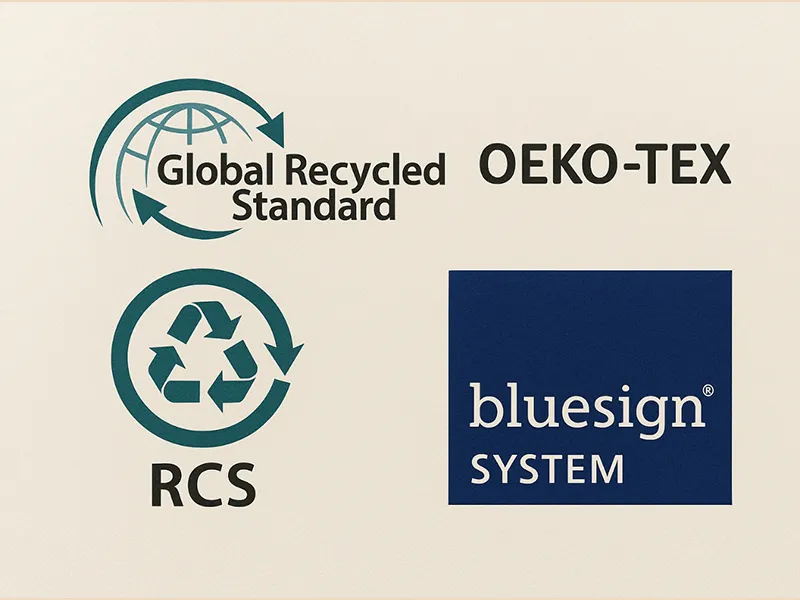To ensure quality, safety, traceability, and sustainability, industry-recognized certifications are essential. These certifications not only enhance brand credibility but also help reassure consumers and business partners about the environmental and ethical integrity of rPSF products.
Global Recycled Standard (GRS)
- Issued by: Textile Exchange
- Scope: Environmental, social, and chemical practices in the supply chain
- Primary Focus: Recycled content (minimum 20%), traceability, environmental responsibility, chemical restrictions, and worker welfare
The Global Recycled Standard (GRS) is perhaps the most comprehensive certification for recycled materials, especially rPSF. It ensures not only that products contain a verified percentage of recycled materials, but also that environmental and social criteria are met throughout the supply chain.
Key Benefits:
- Confirms the authenticity of recycled content
- Prohibits the use of hazardous chemicals
- Promotes ethical working conditions
- Applies to all stages: collection, sorting, processing, manufacturing, and trading
For rPSF producers, having GRS certification can significantly enhance access to global buyers, especially European and North American brands with sustainability mandates.
OEKO-TEX® Standard 100
- Issued by: International Association for Research and Testing in the Field of Textile and Leather Ecology
- Scope: Human ecological safety of textile products
- Primary Focus: Harmful substances in end products
OEKO-TEX® Standard 100 is a globally recognized label that certifies textiles and fibers, including rPSF, have been tested for harmful substances. The focus here is consumer safety, ensuring that final products made from rPSF do not contain carcinogens, allergens, or toxic heavy metals.
Key Benefits:
- Validates rPSF for direct-to-skin applications (e.g., garments, furnishings)
- Tests against more than 300 chemicals
- Accepted by buyers in over 60 countries
- Fast-track compliance with consumer product safety regulations (e.g., REACH, CPSIA)
Manufacturers using rPSF with OEKO-TEX Standard 100 certification gain credibility in apparel, baby products, and home textiles.
Recycled Claim Standard (RCS)
- Issued by: Textile Exchange
- Scope: Verification of recycled material content
- Primary Focus: Traceability in supply chain (minimum 5% recycled content)
The Recycled Claim Standard (RCS) is often considered a stepping stone to GRS. While it does not cover environmental or social aspects, it does provide a chain of custody verification system to confirm the recycled origin of the material used.
RCS is ideal for companies seeking initial validation of rPSF content before pursuing more robust certification (e.g., GRS).
Key Benefits:
- Chain of custody control through Content Claim Standard (CCS)
- Lower certification barrier than GRS
- Accepted for marketing claims about recycled content
bluesign® System
- Issued by: bluesign technologies ag
- Scope: Environmental health and safety (EHS) in the entire textile production process
- Primary Focus: Chemical management and resource efficiency
bluesign® takes a holistic approach to sustainability. In order to reduce energy use, water consumption, and hazardous emissions, it assesses entire production processes. While not specific to recycled materials, it is highly relevant to rPSF producers using dyes, finishes, or processing chemicals.
Key Benefits:
- Promotes cleaner production technologies
- Ensures workers and consumers are not exposed to toxic chemicals
- Helps align rPSF production with circular economy principles
- Recognized by many top global brands (e.g., Patagonia, Nike, The North Face)

ISO 14001 – Environmental Management Systems
- Issued by: International Organization for Standardization (ISO)
- Scope: Internal environmental management and compliance
- Primary Focus: Sustainable production, waste reduction, environmental performance
ISO 14001 certification reflects a company’s commitment to minimizing its environmental footprint. While it does not validate the recycled content of rPSF directly, it provides a framework for sustainable operations in fiber manufacturing plants.
Key Benefits:
- Establishes internal controls for sustainability
- Helps meet ESG reporting requirements
- Reduces energy use, emissions, and waste in rPSF production
- Enhances reputation with investors and regulatory bodies
SA8000 – Social Accountability Standard
- Issued by: Social Accountability International (SAI)
- Scope: Social and labor practices
- Primary Focus: Fair wages, worker safety, child labor prevention
Although SA8000 does not directly relate to recycled content or environmental safety, it plays an important role in ensuring ethical labor practices in the production of rPSF.
As pressure mounts globally for social compliance, particularly in South Asia and Southeast Asia—regions where much of rPSF is manufactured—SA8000 becomes an important addition to any fiber supplier’s certification portfolio.
Higg Index (by SAC)
- Issued by: Sustainable Apparel Coalition
- Scope: Holistic sustainability performance measurement
- Primary Focus: Environmental and social impact across lifecycle stages
The Higg Index is a suite of tools that assesses environmental and social sustainability across the supply chain. For rPSF manufacturers, the Higg Facility Environmental Module (FEM) and Higg Materials Sustainability Index (MSI) help quantify impacts of recycled fiber production—especially compared to virgin alternatives.
Key Benefits:
- Data-driven impact comparisons
- Aligns with brand scorecards and retailer requirements
- Helps companies identify efficiency improvements in rPSF operations
GOTS – Global Organic Textile Standard (optional relevance)
Note: While not directly applicable to rPSF (as it is a synthetic fiber), GOTS sometimes appears in blended textile certifications where rPSF is combined with organic cotton.
For example, a T-shirt made of 60% organic cotton and 40% rPSF could fall under GOTS with RCS input for the polyester content. Manufacturers and brands pursuing hybrid sustainability claims may encounter GOTS in multi-material garments.
Other Voluntary Programs
a. REACH Compliance (EU)
For chemical safety in rPSF production—especially dyes, coatings, and flame retardants—compliance with the Registration, Evaluation, Authorization, and Restriction of Chemicals (REACH) regulation is crucial for exporters to the EU.
b. CPSIA Compliance (U.S.)
The Consumer Product Safety Improvement Act mandates chemical safety in textiles and fibers used for children’s products in the U.S. OEKO-TEX certification helps fulfill this requirement.
c. Green Label / Ecolabels
Various countries (e.g., EU Ecolabel, China Environmental Labeling, India’s Ecomark) offer eco-labels that validate rPSF for local markets. These are typically aligned with government sustainability goals.
Choosing the Right Certification Strategy
| Certification | Recycled Content Verified | Chemical Safety | Social Responsibility | Process Sustainability | Ideal For |
| GRS | ✅ (≥20%) | ✅ | ✅ | ✅ | Full supply chain traceability |
| OEKO-TEX 100 | ❌ | ✅ | ❌ | ❌ | Final product safety, apparel |
| RCS | ✅(≥5%) | ❌ | ❌ | ❌ | Entry-level recycled claims |
| bluesign® | ❌ Not required | ✅ | ✅ Partial | ✅ | Process efficiency and low impact |
| ISO 14001 | ❌ Not required | ✅ Indirect | ❌ | ✅ | Management systems and compliance |
| SA8000 | ❌ Not required | ❌ | ✅ | ❌ | Labor-intensive production regions |
| Higgs Index | ❌ Not required | ✅ | ✅ | ✅ | Performance benchmarking and improvement |
Certification Challenges for rPSF Producers
- Cost and Documentation: Certification processes can be time-consuming and costly. GRS requires audit trails, supplier declarations, and transaction certificates at every step.
- Traceability Complexities: With growing demand for transparency, rPSF producers must use batch tracking, blockchain platforms, or digital IDs to validate claims.Overlap and
- Misunderstanding: Some companies confuse OEKO-TEX (focused on harmful substances) with GRS (focused on content origin and sustainability). Having both is often necessary, depending on the customer.
- Greenwashing Risks: As certifications grow in number, so does the risk of misuse or fraudulent claims. Third-party audits and QR code traceability can combat this.
For recycled polyester staple fiber (rPSF) to fulfill its promise of a truly sustainable textile solution, certifications serve as the backbone of trust and transparency. As the industry advances toward 2030 goals, certification will not be optional—it will be expected.

